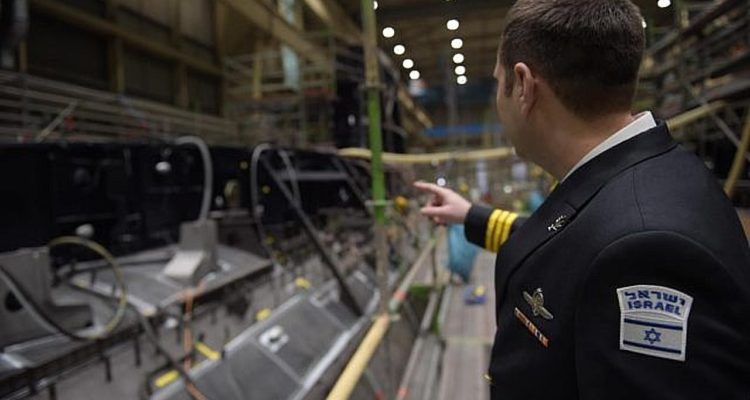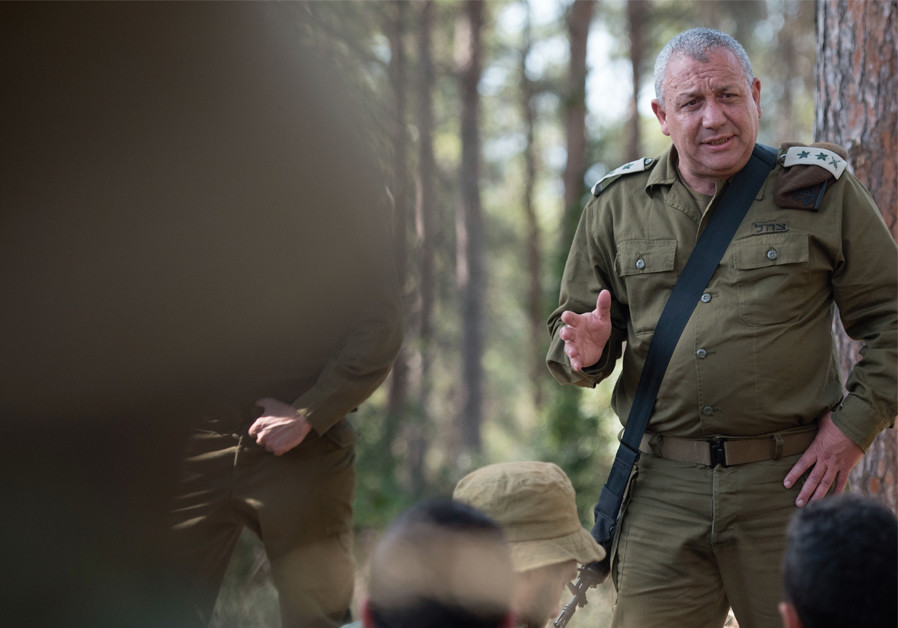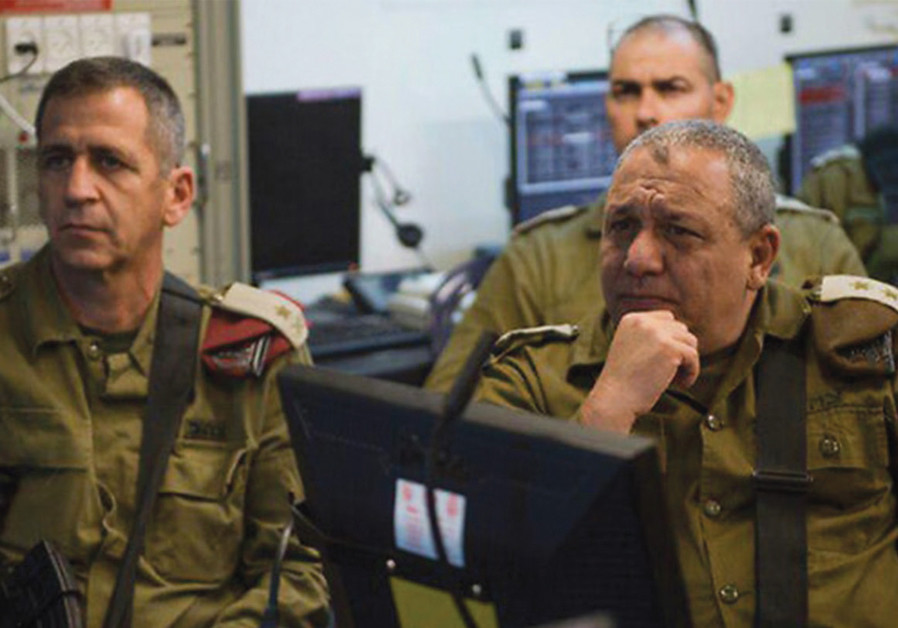“ΑΡΙΣΤΑ” 20 + 1!..
1.
“ΑΙΩΝΙΑ Η ΜΝΗΜΗ“!
‘Schindler’s List’: 25 Years Later

The newsreel, the kind my parents watched in movie theaters at the end of World War II, showed scenes from the liberation of Auschwitz.
Images from that film stay with me to this day — such as the man with sunken cheeks, bones sticking out under his striped prisoner’s uniform staring blankly into the camera.
I knew that his eyes would haunt me for the rest of my life. I wondered what he might have said if given the chance.
Thirty years later, I stood inside Grand Central Terminal in New York as the nonprofit I founded, StoryCorps, opened its first booth. Its goal was to encourage everyday people to interview a loved one and to celebrate the stories we can find all around us when we take the time to listen. Since that day, more than 500,000 Americans have recorded StoryCorps interviews, each of which will live forever in the Library of Congress.
As we mark the 15th anniversary of StoryCorps, I’m reminded that it’s also the 25th anniversary of another effort to illuminate, honor and preserve the human story: producer-director Steven Spielberg’s masterpiece “Schindler’s List.”
My appreciation for the film and for Spielberg is rooted in his belief that there are few actions more important than reminding people that their lives and stories matter. That they won’t be forgotten. That they are not alone.
I spent the days leading up to Thanksgiving debating whether it was time for my 10-year-old son to watch this film.
My son has been asking me questions about the Holocaust for years, but it’s hard to know when the time is right for your child to have that moment, the one I’d had all those years ago.
So while thinking about “Schindler’s List,” I shared with him a StoryCorps interview. In it, Debbie Fisher asks her father to tell her about Auschwitz. Her father had always downplayed his experiences there as a child, insisting that she not “knock on the door.” But when he was gravely ill in the hospital, she knocked one last time. He said, “I’ll let you in, but if I let you in this room, you will never, ever get out. Do you want to come in?”
After a few days, my wife and I decided it wasn’t the right time to let our son in the room.
But late one night recently, I sat down and screened the film alone. As I watched Amon Goeth stand on his balcony and casually pick off Jews with his rifle, I was transported back to my third-grade classroom.
I thought about the word Untermenschen — subhuman — which the Nazis used to call Jews,
blacks, the disabled — anyone who posed a threat to an Aryan “master race.” I thought about how they branded people in concentration camps with numbers, not names.
Which is to say: They didn’t think of them as human beings at all.
This is why, 25 years after its debut, “Schindler’s List” matters more than ever.
Rabbi Abraham Joshua Heschel once said, “Words create worlds.” He would remind his children that the Holocaust didn’t start with the gas chambers. It began with words. With Hitler putting calculated, dehumanizing speech out into the ether.
In the United States today, words of loathing and disgust directed at fellow human beings — whether they be asylum seekers or those we disagree with across political divides — are in the air as they have never been in my lifetime. Something dangerous and toxic has been unleashed in this country and it demands our attention.
Let’s be clear. Are we in 1930s Germany? No.
Are we treating one another in ways that could lead us further down an extremely perilous path? Unfortunately, yes.
With StoryCorps’ new initiative, One Small Step, we are, for the first time, putting strangers across the political divides together in StoryCorps booths, not to talk about politics, but to be reminded of the fact that we are all living, breathing human beings. We hope to convince our countrymen that it is our patriotic duty to recognize the humanity in people who we may have regarded as “the other.”
So far, One Small Step has been working in all the ways StoryCorps hoped it would. Looking another human being in the eyes and asking, “Who are you?” “What lessons have you learned in life?” “How would you like to be remembered?” reminds us that listening is an act of love. Coming face to face with the stories of strangers we may have feared — or even hated —reminds us of our shared humanity.
History has taught us what can happen when we forget those inviolable truths. History also has shown what can happen when the world hears the voices of the most vulnerable among us, as they did a quarter of a century ago in Spielberg’s film. Numbers became names.
Soon after the release of “Schindler’s List,” Spielberg created the Shoah Foundation to ensure
that the voices and memories of all Holocaust survivors could whisper in our ears forever; that their words would help to create a different world, where we listen to one another, where we recognize that what’s at stake are individual human lives, not statistics.
That’s the world I want my son to grow up in.
I await the day when my son watches “Schindler’s List.” He’ll knock when he’s ready to come in the room.
And just as Debbie’s father did for her, I’ll open that door, and sit right there beside him.
Dave Isay is the founder and president of StoryCorps.
“ΒΑΛΤΕ ΚΑΙ ΔΕΙΤΕ ΟΛΟΙ ΞΑΝΑ ΤΗΝ ΤΑΙΝΙΑ“!
… (ΕΙΔΙΚΑ ΟΙ… ΣΥΝΕΡΓΑΤΕΣ ΤΟΥ ΤΣΙΠΡΑ, ΝΕΟ ΧΙΤΛΕΡΙΚΟΙ ΚΛΩΝΟΙ ΤΗΣ “Χ. ΑΥΓΗΣ”)!..
2.
A NEW NATIONAL SECURITY STRATEGY FOR AMERICA
Immigration is America’s top national security threat.
ΕΝΩ ΓΙΑ ΤΗΝ… ΑΝΘΡΩΠΙΣΤΙΚΗ ΕΛΛΑΔΑ ΤΩΝ ΤΣΙΠΡΑ – ΠΑΥΛΟΠΟΥΛΟΥ ΕΙΝΑΙ… ΕΥΛΟΓΙΑ!..

Daniel Greenfield, a Shillman Journalism Fellow at the Freedom Center, is an investigative journalist and writer focusing on the radical Left and Islamic terrorism.
After the Cold War, what is the biggest threat to America? The debate between Obama and Romney famously bogged down over the question of whether Russia was our biggest geopolitical foe. While Obama slammed Romney’s answer as a Cold War relic, after losing the next election, his party defines its foreign policy and domestic opposition around the fear that Russia is now more of a threat than ever.
Answers by other politicians have ranged from the structural, the national debt and internal divisions, to the inanimate and absurd; Bernie Sanders’ claim that global warming is our top national security threat. But assessments that name conditions rather than threat vectors are unhelpful because even when they are right, they tell us to address a weakness or failure, rather than meeting an external threat.
Being able to name and define external threats is vital for reaching informed national security decisions.
The debates over border security, Syria, Afghanistan, and Russian informational warfare have been taking place in a chaotic environment of rapid fire talking points backed by ideological agendas, but with no framework for understanding the larger threat environment and how to achieve national security.
Our national security framework dates back to the Cold War. The doctrines we employed during the Cold War quickly became dated even while the Soviet Union was around. They’re so old now that the vast majority of Americans weren’t even born when they were hatched. And yet in the generation since the Cold War ended, we haven’t found anything new to replace them with. And that is the problem.
The Clinton administration ignored national security and put the military at the disposal of the UN on exercises in nation building that helped revive Russia as a serious threat while ignoring the threat of Al Qaeda. The Bush administration rolled out nation building as a response to Islamic terrorism. This was a misguided approach that failed to understand the nature of the threat and how to address it.
The Obama administration combined the follies of both of its predecessors and added more of its own, by harnessing Clinton style nation building to Bush style interventions with the aim of defusing Islamic terrorism by helping the Muslim Brotherhood and other Islamists come to power in the Middle East.
The result was genocide, ethnic cleansing, beheadings, sex slavery and more terrorism than ever.
To build a realistic national security strategy, we have to discard the Cold War framework under which every administration beginning with Truman and Eisenhower had operated under. We are no longer dealing with a global struggle against an ideological movement based out of a global superpower.
And it’s the global part that is the problem.
Successive administrations have thought of national security as a global issue. But it’s not a global issue. It’s a national one. That doesn’t mean that we should abandon support for NATO or our allies. But we should stop trying to envision national security as something that emerges from global alliances. That worldview may have been relevant during the Cold War, but it’s no longer meaningful today.
Instead we need to think of national security as inside out, coming not from outside America, but from inside it. We don’t face a serious risk of invasion by a military superpower. It may be a generation until China has the military capabilities to embark on such a venture. And while we shouldn’t neglect exploring what a Chinese Pearl Harbor might look like, we first need to get our own house in order.
Our domestic threats in this century have all involved infiltration, whether it was the Islamic colonists who carried out the 9/11 attacks and succeeding acts of terror, and the Chinese and Russian hacks and espionage operations that exposed our military secrets, wrecked the NSA and weakened our defenses.
These catastrophes make it clear that there can be no national security without securing the nation.
That includes border security. Regardless of how many terrorists may have come across the unguarded border (even one is too many), efforts by the Trump administration to reduce travel from terror states and refugee admissions will lead terrorists and future terrorists to seek alternative means of entering this country. And securing the border closes a major vulnerability in our national security.
Furthermore, while Iran’s nuclear program remains a major national security threat, a nuclear attack on America is likeliest to come through a nuclear device smuggled by terrorists across the border. It may never happen, and hopefully never will, but failing to prepare could be a disaster that would make the national security failures that allowed the 9/11 attack to take place seem almost inconsequential.
If we examine the American conflicts of this century, it’s easy to see that they had their roots in immigration, migration and open borders, both physical and virtual. We’ve lost over 10,000 Americans in wars caused by a failure of immigration security. And the national gun violence rate is largely fed by gang violence. Much of that gang violence is caused by legal and illegal immigration to the United States.
National security threats can be most clearly measured by the violent deaths of Americans inflicted on us by organized movements and groups. It’s undeniable that these have originate with immigration.
China and Russia remain geopolitical threats. But their attacks depend on infiltrating our country through the internet or immigration. Informational security is vital to any future conflict. A Chinese Pearl Harbor would likely begin on the internet. And so is immigration security. Chinese and Russian operatives, like their Islamic counterparts, have to enter the United States. If we can secure immigration and secure information, we will have effectively neutralized their attacks for the time being.
The leading geopolitical threat isn’t posed by China or Russia. Instead it comes from Islamic terrorism. While China poses a military threat to its neighbors in Asia and Russia poses a military threat to Europe, Islamic terrorists piggyback on Islamic colonies in America to pose a military threat inside our borders.
Aside from the loss of life, Islamic terrorists have inflicted trillions of dollars in economic losses on the United States, second only to the People’s Republic of China. And as the Islamic colonies increase in size, they begin to pose an increasingly greater threat. Islamic colonies in France and Sweden have shown behavior resembling the early stages of guerilla warfare. The same thing will happen in America.
That is why immigration security must be the first priority of any national security strategy. The second priority should focus on weakening terrorist groups and their state sponsors abroad, but without the extensive nation building commitments that have bogged down previous administrations.
We should also avoid the Cold War’s sociological preoccupation with root causes abroad. Sociological philosophizing failed miserably in the Great Society. There is no reason to believe that the same approach that failed at home will work any better when applied to other societies and cultures.
It isn’t difficult to identify malaises in the Muslim world, but we should be wary of facile solutions, such as democracy, feminism or microfinance, for solving them. The United States did not fix the social problems of Communism. Instead it sought to contain Communist states, limiting their influence, preventing their expansionism, and allowing their own social problems to destroy them.
Instead of nation building in Muslim countries, we should aid non-Muslim or secular countries under siege by Islamists, containing and limiting the spread of Islamic ideology abroad and at home through economic, informational and military means, when appropriate, without extended occupations.
The interregnum between the fall of the Ottoman Empire and the fall of the British Empire marked a period of Islamic military, cultural and political decline. The Cold War era revived Islamic fortunes as the United States and the Soviet Union invested extensive wealth, information and training into Muslim countries. After the fall of the Soviet Union, Muslim terrorists backed by Muslim states emerged as the leading antagonists of the United States, Europe, Russia, China and other non-Muslim world states.
While a global alliance against Islamism, similar to the one against Communism, might be ideal, it is more likely that America’s geopolitical antagonists, Russia and China, will instead back Muslim factions in proxy wars against us. We must stop doing the same thing no matter how appealing it may seem.
Political and military engagement with Islamic forces badly weakened both America and Russia. After two generations of arming, aiding and collaborating with Islamic terrorists under the Soviet Union, and then another generation of Putin’s Eurasian experiment aimed at integrating Islam into a new Russian empire, our old antagonist has doomed itself. We should learn the urgent lessons of Russia’s folly.
Because they are also our own.
America’s Cold War alliances with Islamic countries helped create the wave of terror. Our openness to Islamic immigration was once seen as a means of building Cold War alliances. Instead it has killed over ten thousand Americans and put us on a path to a religious civil war similar to that of Europe.
Cold War divisions have deeply divided Americans. The collapse of religion and traditional values, accompanied by mass migration, and the disruptive qualities of the internet, have fragmented any notion of national unity. The firehose of mass migration is hitting all of our fracture points, ideological, economic, social and cultural, at the same time. It’s also the essential vector for Islamic terrorism.
America needs time to recover from the economic, social, cultural and technological disruptions of the last hundred years. And it needs breathing room to prepare for the geopolitical conflicts to come.
American elites continue focusing on a global order while ignoring the decline of the United States. A broken America will be unable to meet any geopolitical threats abroad. Any national security strategy that does not begin with securing our own national security at home will be doomed to fail.
Democrat opposition at the state and judicial level has prevented President Trump from exercising control over immigration, protected terrorists and gangs, while leaving our borders unsecured. States and cities openly defy immigration authorities and Democrat judges sabotage any effort at controlling the flow of legal and illegal aliens into our country. This thoroughly cripples our national security.
America’s national security depends on restoring the control of the executive branch over our borders.
The President of the United States has been robbed of the ability to fulfill his sworn duty to see to the national security of the United States. This isn’t just political opposition. It’s treason. And it must end.
3.
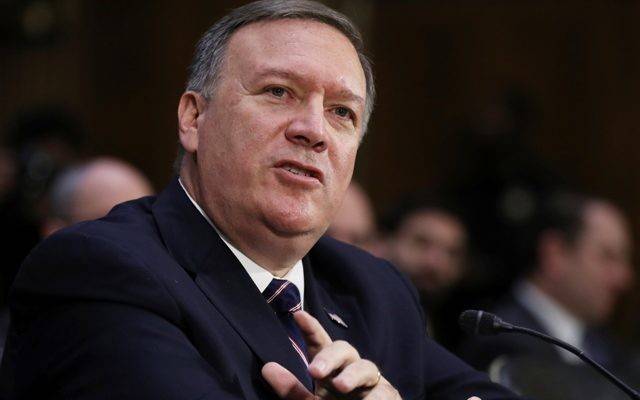
By: Associated Press and United with Israel Staff
U.S. Secretary of State Mike Pompeo delivered a scathing rebuke of the Obama administration’s Mideast policies on Thursday, accusing the former president of “misguided” and “wishful” thinking that diminished America’s role in the region, harmed its longtime friends and emboldened its main foe: Iran.
In contrast, Pompeo vowed that the U.S. now “will use diplomacy and work with our partners to expel every last Iranian boot” from Syria, in an effort “to bring peace and stability to the long-suffering Syrian people,” reported Times of Israel.
In his speech to the American University in Cairo, Pompeo unloaded on Barack Obama, saying he was naive and timid when confronted with challenges posed by the revolts that convulsed the Middle East, including Egypt, beginning in 2011.
“Remember: It was here, here in this very city, another American stood before you,” Pompeo told an invited audience of Egyptian officials, foreign diplomats and students. “He told you that radical Islamist terrorism does not stem from ideology. He told you 9/11 led my country to abandon its ideals, particularly in the Middle East. He told you that the United States and the Muslim world needed ‘a new beginning.’ The results of these misjudgments have been dire.”
Pull No Punches
“In falsely seeing ourselves as a force for what ails the Middle East, we were timid about asserting ourselves when the times — and our partners — demanded it,” Pompeo said, without mentioning the former president by name.
Pompeo’s speech came on the third leg of a nine-nation Mideast tour aimed at reassuring America’s Arab partners that the Trump administration is not walking away from the region amid confusion and concern over plans to withdraw U.S. forces from Syria.
Pompeo blamed the previous administration’s approach to the Mideast for the ills that consume it now, particularly the rise of the Islamic State group in Iraq and Syria and Iran’s increasing assertiveness, which he said was a direct result of sanctions relief, since rescinded by the Trump administration, granted to it under the 2015 nuclear deal.
“The good news is this: The age of self-inflicted American shame is over, and so are the policies that produced so much needless suffering,” he said. “Now comes the real ‘new beginning.’ In just 24 months, actually less than two years, the United States under President Trump has reasserted its traditional role as a force for good in this region, because we’ve learned from our mistakes.”
‘A Force for Good’
In the speech entitled “A Force for Good: America’s Reinvigorated Role in the Middle East,” Pompeo extolled the Trump administration’s actions across the region cementing ties with traditional friendly governments, taking on the Islamic State group in Iraq and Syria and imposing tough new sanctions on Iran.
“President Trump has reversed our willful blindness to the danger of the regime and withdrew from the failed nuclear deal, with its false promises,” Pompeo said.
Since withdrawing from the nuclear deal last year, the administration has steadily ratcheted up pressure on Tehran, which is widely viewed as the most destabilizing influence in the region. It has vowed to increase the pressure until Iran halts its “malign activities” throughout the Mideast and elsewhere, including support for terror groups in Yemen, Israel, and Lebanon and its role as Syrian dictator Bashar Assad’s primary protector.
4.
Turkey says offensive against Kurds not dependent on US pullout
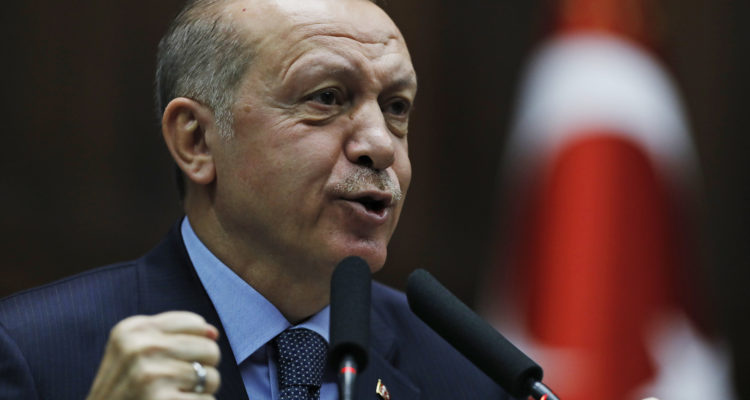
Turkey’s Foreign Minister Mevlut Cavusoglu said Thursday that a Turkish strike in northern Syria would not be dependent on U.S. troops leaving the area.
“If the [pullout] is put off with ridiculous excuses like Turks are massacring Kurds, which do not reflect the reality, we will implement this decision,” Çavuşoğlu said, referring to Turkey’s planned military invasion against Kurdish forces in Syria, Agence France-Presse reports.
Turkey is upset that America has slowed its planned withdrawal of 2,000 troops from Syria, partly in order to ensure the protection of its Kurdish allies. U.S. President Donald Trump promised Turkish president Recep Tayyip Erdogan he would remove U.S. forces from the region in an apparently on-the-spot decision last month which surprised U.S. allies and even members of his own administration.
Erdogan tore up the written request in a theatrical gesture during a speech in Turkey’s Parliament, on Tuesday.
“Soon, we will eliminate all of the terror elements in Syria. If any group tries to interfere with our mission in Syria, we are duty bound to destroy it as well,” he said, telegraphing an ominous fate for Kurdish fighters.
The Kurdish forces in Syria are known as YPG, an acronym for People’s Protection Units. It’s the main component of the Syrian Democratic Forces, an umbrella group that includes a number of militias that fought against ISIS in Syria with American aid.
5.
Does Chinese election meddling threaten Israeli democracy?
6.
Palestinian planning Netanyahu assassination gets 11 years
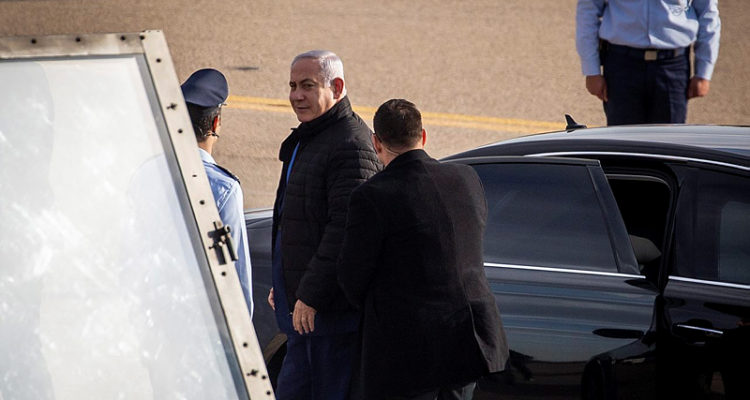
By David Isaac, World Israel News
Mohammed Jamal Rashda, 31, a Palestinian Arab who planned to assassinate Prime Minister Benjamin Netanyahu, was sentenced to 11 years in prison on Thursday.
Most of the details of the indictment agains Rashda remain hidden, according to Israel’s Hadashot news website. But what is clear is that Rashda worked under the direction of foreign terrorist elements. The convicted terrorist wasn’t only going to target Netanyahu, but other senior Israeli figures, among them former Jerusalem Mayor Nir Barkat.
In order to advance their terror plans, the unnamed group he was working for intended bring in a terrorist from Jordan.
According to the indictment, the Palestinian terrorist had already started gathering information about his targets, under the instructions of a terrorist from Syria.
![[ rfe/rl banner ]](https://www.globalsecurity.org/wmd/library/news/uk/2019/rferl-article2.gif)
Russia Condemns British Plans To Build Military Bases
Moscow has condemned Britain’s plans to build new military bases in Southeast Asia and the Caribbean, saying Russia is prepared to take retaliatory measures if its own interests or those of its allies are threatened.
British Defense Minister Gavin Williamson told the Sunday Telegraph in December that Britain could establish the new military bases “within the next couple of years” after the country leaves the European Union.
Williamson said the expansion would be part of a strategy for Britain to become a “true global player” after Brexit.
He did not specify where the bases might be built. But the newspaper reported that options included Singapore or Brunei near the South China Sea and Montserrat or Guyana in the Caribbean.
Speaking on January 11, Russian Foreign Ministry spokeswomen Maria Zakharova said Williamson’s comments were baffling and warned that such plans could destabilize world affairs.
“Of course, Britain like any other country is independent when it comes to its military construction plans. But against the backdrop of overall rising military and political tensions in the world…statements about the desire to build up its military presence in third countries are counterproductive, destabilizing, and possibly of a provocational nature,” she was quoted as saying by TASS.
Russia has military bases in several former Soviet countries. It also operates military facilities in Syria and Vietnam.
Based on reporting by Reuters and AP
Source: https://www.rferl.org/a/russia-condemns-british-plans- to-build-new-military-bases/29704244.html
15.



ISRAEL’S ELECTION FRENZY
Will the Likud coalition and Netanyahu continue to lead?

The announcement by Prime Minister Benjamin Netanyahu and Likud coalition partners, on Christmas Eve, 2018, calling for early elections scheduled to be held on April 9, 2019, has plunged Israel into a political frenzy. The declared reason for an election that few of the coalition partners really wanted, was cited by the government as differences within the coalition over the new military conscription bill affecting exemption for ultra-orthodox Jews or Yeshiva students in particular.
Netanyahu’s government had a mandate to govern for another year (November 2019) unless the opposition unseated it in a “no confidence vote,” that did not occur. The ostensible reason for the early elections is the departure of Avigdor Lieberman’s Israel Our Home (Israel Beitenu) from the coalition along with its 5 seats in the 120 seat Knesset (Israeli Parliament), which left the Likud coalition with a single majority vote of one, or 61 seats.
Speculations by some in the Israeli media, that Netanyahu was driven to have the snap elections namely because of his legal troubles, before the attorney general decides whether to follow police recommendations to indict him, obfuscate the fact that Netanyahu is still the most popular politician in Israel. All polls have shown that Netanyahu is far ahead of his nearest rival in the post of Prime Minister. Moreover, the same polls have shown that the Likud, with Netanyahu at its helm, would retain its strength and perhaps even make additional gains in the upcoming elections.
Clearly, none of the contenders for prime minister have the accumulated experience Netanyahu has, nor the economic credentials he has earned in transforming the Israeli economy. Netanyahu’s warm relations with world leaders including U.S. President Donald Trump and India’s Prime Minister Narendra Modi, are examples, to name a few. In addition to being Prime Minister for 13 years, Netanyahu served as Israel’s ambassador to the UN, Finance Minister under PM Sharon, Foreign Minister since 2015, and Defense Minister in 2018. No other candidate can match his credentials, especially if one adds his educational background as a graduate of MIT, and Harvard, and his military service as a Captain in the elite Sayeret Matkal.
Israeli pollsters have recorded the following results on January 4th, 2019, polling for the National Legislative Elections to be held on April 9, 2019. Makor Rishon (1/4/2019) has Likud (led by Netanyahu) with 26 seats, Yesh Atid (Yair Lapid’s party) 17, Joint List (Arab list) 12, Hosen (Gen. Benny Gantz’s new party) 12, Labor 10, New Right (Naftali Bennett’s new party) 10, United Torah Judaism (UTJ) 6, Jewish Home (without Bennett, Ayelet Shaked, and Mualem) 5, Shas (the Sephardic Orthodox party led by Areyeh Deri) ) 5, Meretz 5, Gesher (Orly Levy-Abekasis party. She had left Israel Beitenu to form her own list. She is the daughter for former Likud Vice premier David Levy.) 4, Israel Beitenu (Avigdor Lieberman’s party) 4, and Kulanu (Led by Finance minister Moshe Kahlon) 4. Tzipi Livni was removed by Labor party chairman Avi Gabai, from the partnership called the Zionist Camp.(Labor will resume its previous name.) Her party, Hatnuah, received 0 seats in the poll. The threshold for gaining a seat is 3.25% of the vote.
Maariv’s poll (Israeli daily newspaper) has Likud at 30, the Arab Joint List 13, Hosen 12, Yesh Atid 12, New Right 11, Labor 8, UTJ 7, Meretz 5, Shas 5, Kulanu 5, Jewish Home 4, Israel Beitenu 4, and Gesher 4. Tzipi Livni’s Hatnuah again received 0 seats.
Under Makor Rishons scenario, the Likud and the Center-right coalition would safely master 56 mandates, or the combined mandates of the Likud, Bennett’s New Right, UTJ, Shas, Jewish Home, and Kulanu. The Center/center-left bloc combining Yesh Atid, Labor, and Meretz would receive 32 seats. Assuming that Gantz’s Hosen, Avigdor Lieberman’s Israel Beitenu, and Orly Levy’s Gesher will be joining the center-left bloc, the combined total would only be 52. The Arab Joint List could silently back such a coalition, but it still would be a fragile and ineffective government that will not last long. Conversely, Benny Gantz might just as well decide to go with the Likud coalition. This would create a secure coalition government with 68 seats. Netanyahu would likely reward Gantz by handing him the Defense portfolio.
The Maariv poll is even more favorable to a center-right coalition government. It would give Likud, New Right, UTJ, Kulanu, Shas, and Jewish Home a majority of 62 without having to resort to other parties. Netanyahu would likely seek a wider coalition as to not depend on Bennett or the religious parties, and invite Gantz to join the coalition. With 11 seats, Bennett would demand the Foreign Ministry in addition to Ayelet Shaked keeping the Justice portfolio, along with the Education portfolio.
There is a strong likelihood that Moshe Ya’alon, the former Defense Minister and the IDF Chief-of-Staff, will throw his hat into the political ring, and form his own party. That would split the center-left votes even further. This would mean that at least two former Chief-of-Staff will split many of the center and center-left votes, especially if Ehud Barak, the former Prime Minister and Chief-of-Staff enters the race, too. There are some reports of talks between Gantz and Ya’alon on a possible merger of forces. Walla News reported that Brig. Gen. Gal Hirsch might join the Likud list, adding another ranking IDF officer to the race. According to Walla News, Gantz’s new party will take away votes from Yair Lapid’s Yesh Atid and from the center-left. In recent weeks Kulanu has lost two of its star MK’s, Michael Oren, former Israeli ambassador to the U.S. retired from politics, and Maj. Gen. Yoav Galant, who has joined the Likud.
In a Walla News December 27, 2018 poll, the center-right coalition led by Netanyahu is once again triumphant with 58 mandates, against the center-center left parties including Gantz’s Hosen, who together can count on only 51, excluding the Arab Joint List with 11 mandates. In the Walla poll, should Gantz run as an independent, Likud led by Netanyahu will receive 31 seats, Gantz’s Hosen 14, Yesh Atid led by Yair Lapid 12, The New Right/Jewish Homeheaded by Bennett 11. The Arab Joint List, led by Ayman Odeh 11, Labor/Zionist Camp led by Avi Gabai 9, UTJ led by Rabbi Yaakov Linzman 7, Meretz headed by Tamar Zandberg 6, Avigdor Lieberman’s Israel Beitenu 5, Moshe Kahlon’s Kulanu 5, Orly Levy’s Gesher 5, and Ariyeh Deri’s Shas 4.
Much can happen between now and Election Day on April 9, 2019. However, given the strength of the Israeli economy, and the warm relations between the Trump administration and PM Netanyahu, Israeli voters are looking for social and economic stability. The security situation is somewhat worrisome. Hamas’ continued attempts to disrupt life for Israelis living in the Western Negev has to come to an end, and the Israeli government is likely to address that in the coming months. In the north, the Lebanese-Shiite terrorist Hezbollah backed by Iran, seeks to open two fronts against Israel, both in southern Lebanon, and the Golan Heights. The IDF surprised the group by finding and blowing up Hezbollah’s terror tunnels. On this front, Netanyahu’s has been most vigilant, albeit, the proliferation of army generals joining the political fray on both sides of the political divide, would make security a major issue in the coming months. In the end, however, unless Netanyahu is indicted and goes to prison, Israel will continue to be governed by the Likud coalition and Netanyahu as Prime Minister.
17.
Hamas’ version of Israel’s covert operation in Gaza two months ago
The Israeli undercover unit that was exposed on Nov. 11 in the Gaza Strip near Khan Younes was assigned with planting eavesdropping devices in Hamas’s operational communications systems, Hamas armed wing spokesman Abu Obeida told a news conference on Saturday. Obeida presented a photo and the full identity of the IDF colonel who was killed in the incident, as well as video clips showing the Israel unit moving around Palestinian urban areas in a small truck and an old Volkswagen transporter.
How Shin Bet chief’s election meddling comment on Iran and Hizballah morphed into media frenzy against Russia
In his lecture on Jan. 8 before the Friends of Tel Aviv University, Argaman said: “I don’t know to whose benefit or disadvantage that intervention is aimed, or that country’s political interest, but it will certainly intervene – and I know what I am talking about.” But then, in answer to a question from audience, the Shin Bet chief remarked in an aside that Iran and Hizballah may be planning cyber attacks on targets in Israel.
This remark was drowned out by the wild panic Israeli media whipped up against Russia, which no one had accused. Attempting to cool the hysteria, the Shin Bet security service issued a statement asserting that Israel and its intelligence services were fully capable of handling a cyber attack and armed with all the tools and resources for locating, monitoring and thwarting any such intervention. This statement was drowned out too. The denial hastily issued by Kremlin spokesman Dmitry Peskov on Wednesday was reported but not addressed.
Israel’s voters cast their ballots on paper, not electronically, and so foreign influence peddlers would have to focus their efforts on disinformation and disruption. No Israeli official or media outlet has explained what interest President Vladimir Putin might have in sowing mayhem in Israel’s election – especially when so much of it is self-inflicted. All the “information” published comes from cyber experts – not politicians. And so no one is asking that question. If they did, they may will conclude that, with all due respect, Israel is not the United States of America and Binyamin Netanyahu is not Donald Trump. Israel is therefore not exactly pivotal to Putin’s global strategy.
Any cyber threats are more likely to come from Israel’s own neighborhood, which its cyber warfare experts are experienced in handling. But, above all, Israel has much thornier issues to take up with Moscow, such as the restrictions the Russians have clamped down on Israeli air strikes against Iranian targets in Syria. Such issues are not addressed by the columnists. The artificial storm raised over an illusory cyber war waged by Moscow may needlessly ramp up friction with Moscow at a time when amicable dialogue would better serve Israel’s fundamental security compulsions.
19.





